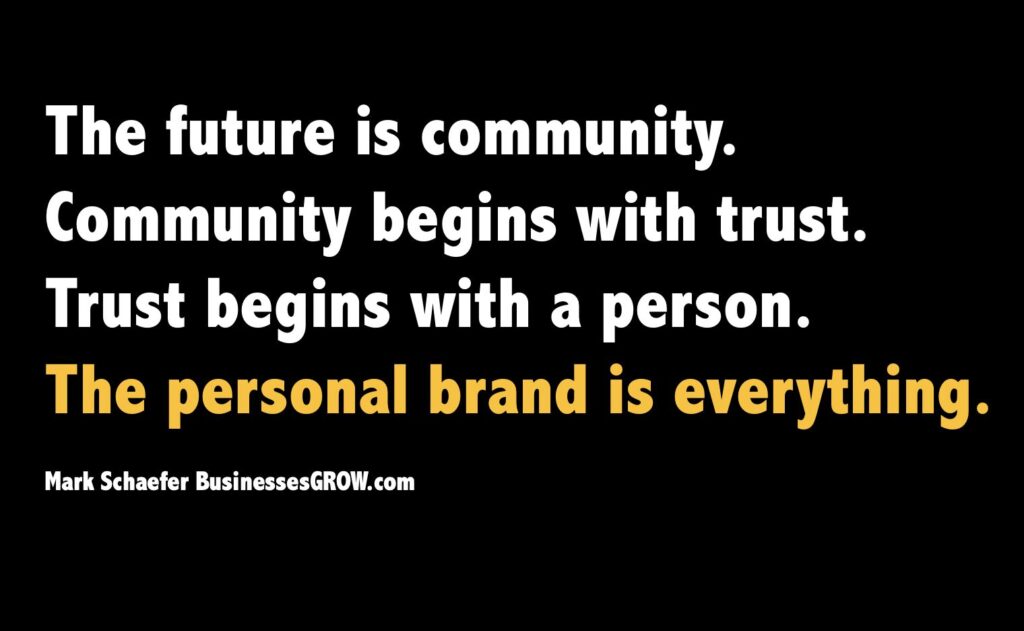 Social media and personal branding are like peanut butter and jelly. Sure, you can have one without the other, but why would you…ever?
Social media and personal branding are like peanut butter and jelly. Sure, you can have one without the other, but why would you…ever?
Whether you’re a CEO of a large company, an employee at a small local company or somewhere in between, you are representing yourself when you’re online. Everything you say and do speaks to your personal brand.
- How do you want to be perceived?
- What do you want to be known for?
- What is your unique selling proposition?
- What differentiates you from everyone else?
Don’t let what differentiates you turn out to be your worst nightmare.
Imagine this: A professional expert in your industry is speaking at a conference, networking event, or even a zoom meeting. What would your perception be if that expert brazenly started sharing their views on a non-related, incendiary topic like politics, sex or religion? You might have experienced this already (I know I have).
It doesn’t matter whether you agree or disagree with this person’s viewpoint, because in a first-impression-situation, that’s secondary. The fact that they feel compelled to express their opinion on an unrelated topic in a professional environment tells you something about them, right? For me, it says they don’t care a lot for those around them; it says they care more about themselves and instilling their beliefs onto you.
Ugh, what a turn off.
You only have one chance to make a great first impression, and sometimes on social media, that’s all you get.
Think carefully about how others view your behavior. Don’t allow what you say in a spur of the moment define you forever to those around you.
When you’re using social media professionally, it’s about putting your prospects first, not your urge to respond or share.
Even though it’s common knowledge that in social situations you should never visit incendiary topics, somehow that rule is getting lost when it comes to social media. Outrage drives algorithms and we are nearly powerless against it.
Resist the urge to give into the outrage machine.
Outrage only feeds social media platforms and rarely has a net positive for you and your personal brand.
Most people are not even aware of this manipulation. In fact, it feels good to participate. We get a lot of positives from social media but there are a lot of negatives if you don’t have a firm foundation of who you are and how you choose to be seen, up to and including your mental health.
My recommendation is to temper your actions by thinking before you jump in. This is not an easy task, we’re fighting the algo’s after all, but with practice, it becomes habit. I’ve practiced it for years now and there are still times when I’ve written something, rewritten it, deleted it and started over, and sometimes just cancelled it, before I’ve hit send.
Here’s my rule of thumb: I ask myself, “Does my comment add value to the conversation?” I can’t tell you how many times that has saved me from my urges. It will save you, too.
Social media is a minefield and if you’re not hyper-aware about protecting your personal brand, it can turn into a negative experience for the recipients of your posts. Your connections will mute, block, and/or unfollow you and most of the time, you’ll never know they did it until it’s too late.
Get my latest business tips, exclusive content, and a bit of fun straight to your inbox with the Kruse Control Newsletter. Sign up now – it’s free!
The Internet is forever.
My friend Mark Schaefer does a wonderful job of engaging on social media. He is solid in his personal brand – he knows who he is and why he does what he does.
Mark shared this thought on LinkedIn recently and it caught my eye:

In today’s Internet, a personal brand and reputation are the very currency we trade on.
In a world where everything we say and do is cataloged, wouldn’t you agree it’s crucial to pay close attention to what you say and do online?
Every time you are online, in a meeting, at a conference, networking reception, or even a backyard BBQ, be mindful of two things:
- What others are experiencing about you.
- What you want others to experience about you.
In each of your engagements, your customers, peers and even friends and family, are evaluating you, often subconsciously. When you’re completely dialed into your personal brand, there is no difference between #1 and #2.
Social media and personal branding should be part of every salesperson’s toolkit.
Your reputation is at stake with everything you say and do – social media only amplifies it. You can’t afford to make unforced errors on social media with your reputation. All it takes is one time and all your hard work of trust building evaporates.
For business leaders, incorporating social media and personal branding within your organization’s sales methodology builds trust with consumers and the result is more profitable deals and satisfied customers.
The fact is that social media is how some customers prefer to connect with companies. At the very least, they’re likely to take a look at your profiles. If you manage salespeople today, social media and personal branding should be part of your overall training curriculum. Salespeople should know the basics of how to approach this medium and it’s certainly in the company’s best interests to make sure what’s said is appropriate and helpful.
Let’s talk about social selling for a minute.
Social selling is a technique used by savvy salespeople to laser-target their prospecting, establish rapport through existing social connections and ultimately act as influencers when sales conversations come up.
Social selling is leveraging the good you do and the positivity you convey, to attract more connections and prospects. Selling happens organically, but not by happenstance. People begin to know you, learn what you contribute and how you bring value and those actions pay off when people think of you when it’s time to buy.
I’ve seen some crazy stuff that didn’t have to happen.
I’m sometimes astounded by various salespeople’s behavior on social media. I understand and have compassion for the need to express the injustices they feel and how wrong other people’s thinking might be. I’m not saying they shouldn’t participate in advocacy for their cause. But a lot of the time, it’s their opinion, and that gets tricky.
What I am saying is take a beat. Before you hit send, ask yourself, “Would I follow me based solely on this one post/comment?”
The difference between posts that make people shudder and a post with super valuable content that makes people want to follow you, is personal branding.
When you know exactly who you are at your core and approach social media knowing why you do what you do everyday, the content you post shifts in a positive direction, sometimes resulting in sales. It becomes flavored with your authenticity, vulnerability and credibility. You become more aware of how you’re seen by others and that motivates you to enhance your value in social and sales relationships.
Don’t be a candidate for the Unfollow (or worse, the Block!).
Take a beat and think before you hit send.
Don’t be that person who everyone unfollows – we are all too connected now and it could be the gateway to becoming known for all the wrong reasons. Instead, treat your social media profiles as community-building assets where people look to you for sound advice and trustworthy information about what you sell.
Your personal brand is about making a full-time commitment to the journey of defining yourself as a leader and how this will shape the manner in which you will serve others.
Your personal brand should represent the value you are able to consistently deliver to those whom you are serving.
Everything you post leaves an impression. Your own reputation as a well-informed, trusted resource is at stake here. Think carefully. Post responsibly. Allow your personal brand to shine through.
Do you sell cars? Want to sell more? Grab your Ultimate FREE Guide to Social Media for Car Salespeople 👉 HERE.
